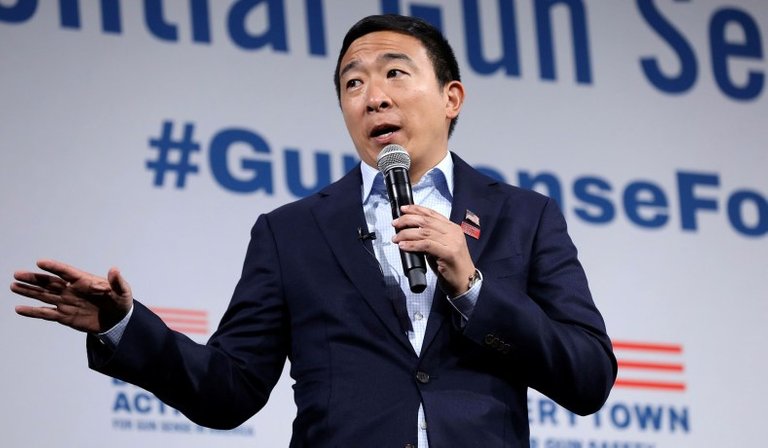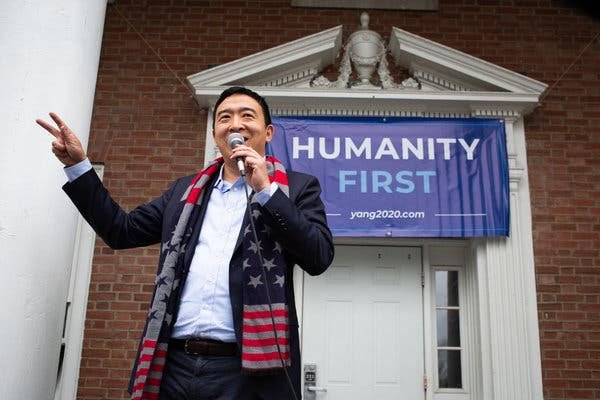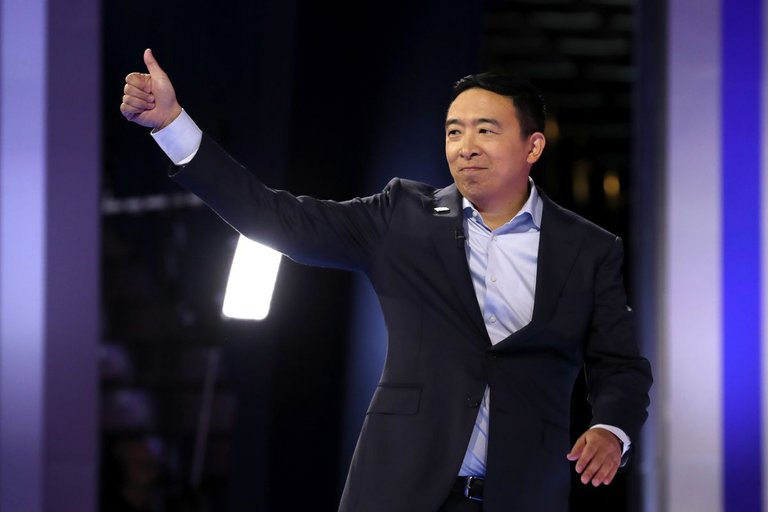Andrew Yang and his struggle to make not only the United States, but the world, in a more egalitarian and fair place for those who really need it.

Founder of Venture for America (an organization that offers entrepreneurship training scholarships), author of Smart People Should Build Things (published by HarperCollins), and The War on Normal People (about work automation published by Hachette Book Group. ) this 44-year-old is an american entrepreneur who has a visionary look into the not too distant future.
Among his two biggest projects today are plans to become the next president of the United States (in 2020, representing the Democratic group) and an ambitious project that in response to the replacement of humans by robots at jobs, will benefit every citizens of certain ages with a $ 1,000 check each, montly. Some people call him crazy, but the fact is that not only does this idea of him make sense... But the way he thinks and sees things (in a clearer way).
When asked if such a measure would not accommodate people, Yang replied that "value, in his view, would not be enough to discourage people from working, as it alone would provide nothing but survival", By doing so, he shows that he has a line of thinking that meets the needs of the population most in need of help and shows himself as a presidential candidate who has his feet in the reality of the country, where the minimum income of an American - according to studies conducted in 2016 - it is $ 2,600.
The main political flag he raises is directly tied to a universal basic income (UBI) and that is reason enough to pay attention to his ideals and what he has to say not only to United States, but to the world. According to him, the United States has many resources that are just not being distributed correctly to people who really need it and I think this is very obvious, right? I mean... Who can deny that income concentration is unfair?

If this distribution were readjusted, he believes that the potentiality of this egalitarian measure would be able to bring about a change in the mindset of people... that would go from a constant mindset of scarcity to a mindset of survival and assured possibility. With this in mind, the result would be a remarkable improvement in people's mental well-being, and the encouragement of creativity and entrepreneurship would reach broader meanings and become more meaningful attitudes and their less bureaucratic processes.
Seeking to "fund" his idea of basic income, he proposes to tax the companies that have benefited most from automation (and their numbers are quite robust), which tend to take jobs from people. In practice, the fee would consist of a 10% value added tax on goods and services produced... Which sounds pretty fair, in a very consistent way. Finances need to be better managed and he knows how to do that.
Yang is concerned about the effects of automation on industries as one of the cornerstones of his organization, which, because it focuses on entrepreneurship for job creation, clashes with the idea of spreading robots to perform human functions. This kind of thinking is not new, since before founding it, Yang worked in startups and was CEO of Manhattan Prep. (an american educational test preparation company).
Since 2009, his contact with entrepreneurship has been intensified, when the company was acquired by the American Kaplan and since then, his corporate worldview continues to be more inclusive and the fact that he is in tune with market news (for example, he is in favor of the world of cryptos, ie... he advocates a decentralized economy... and we know: the future of money is virtual and this is something impossible to deny, no matter how many arguments against it may be out there) only reinforce the idea that he is a candidate with a high potential and needs to be recognized as an equal to the other competitors.

Yang's communication is more fluid, ethic and realistic (exactly what a society needs to stay united and strong as a big and important community), and despite what he wants to sound like a kind of beautiful utopia for many people, all he thinks is well founded on plausible and perfectly possible arguments. He really needs more time to be able to talk about what really matters, who really matters... So, let Yang speaks!
For all these "out of the box" ideas, is Yang a dreamer who envisions a utopia or just a person with a realistic worldview and bold plans that has been ignored? Particularly speaking, although I am not an American citizen I believe that his view of the reality of the facts should be taken into account because he seems to have a great understanding of the problems that are hidden in the most obscure places of this political system.
This is my contribution to @theycallmedan CAMPAIGN for a candidate who is being heavily repressed by mainstream media (and apparently has predefined letters in the political game) and has, primarily, a small group of alternative social media (however, all of them with great potential when it comes to making a big noise) to "pop up" his name everwhere.
Government forced redistribution of wealth and a decentralized economy are not compatible ideas. His ideas aren't out of the box or even original and certainly aren't good (in my opinion of course).
I hate the idea of punishing companies for being more productive. Should we go back to using shovels instead of bulldozers? Of course not... Automation does take some jobs away but it also creates new jobs. Unemployment levels are currently at or near record lows. A 10% VAT sounds okay until you stop and consider how much of a tax that actually is (a VAT taxes an item and its components at all levels of production so a finished product has had the tax applied numerous times) and how much we are already taxed (currently government already confiscates nearly half of all wealth in the form of taxes...income tax, property tax, sales tax along with various other taxes...how much is enough?).
Government is constantly trying to fix problems by introducing or contributing to new ones. People complain of automation and the effect it has on jobs but increasing the minimum wage drives companies to use more automation. Implementing more taxes just means the government wasting more money and more money for corporate tax attorneys. Better to simplify the tax code drastically and lower taxes. Lower rates and fewer complexities and loopholes. Do you really think it is a coincidence that states with the highest taxes and most government intervention have the highest homeless rates per capita and associated problems (e.g. California)?
Income distribution doesn't have to be "fair" and in a truly prosperous economy it won't be. A "fair" distribution will lead ultimately to a lower standard of living for the vast majority of people. People concentrate too much on income inequality but don't pay attention to the fact that the quality of life for everyone has been getting better and better at all income levels as the years go by. The economic pie has been growing for virtually everyone even if it grows for some more than others.
I'm not opposed to a voluntary UBI if such a thing can be implemented and that would be in line with a decentralized economy. We've seen various rudimentary experiments with that in the crypto world but it remains to be seen if it can amount to something meaningful.
UBI is a massive trojan horse. He's peddling fear, just like all the others. In his case - fear of robots.
At least his concern in real, @buggedout... Because process automation if done massively will become a big problem.
Automation has been done massively starting with the industrial revolution. And if not "automation" in the early days then other massive labor reducing innovations and inventions like the creation of the assembly line and the invention of heavy construction equipment, etc. Robots have been putting together stuff in factories for decades and automation has been spiraling upwards since the computer age began. Yet unemployment is as low or lower now than it has ever been. Sounds like a "solution" in search of a problem to me. Thus far, automation has led to massive changes in the kinds of work but it hasn't actually eliminated any work as far as I can tell. I'm not saying it can't happen but based on past experience I'm not sure why we should assume it will.
We already have welfare, food stamps, obamacare, medicare, medicaid, social security, and probably others I am forgetting. Actually, I just looked it up and there are over 80 social welfare programs that include everything from housing assistance to educational grants. That doesn't count state programs. Want to replace all of that with a UBI? I might be able to support that. Add it on top of? Forget it.
Want to replace the income tax with a VAT and make the income tax unconstitutional again? I might be able to get behind that. But add yet another Federal tax on top of what we already have? Forget it. Enough is enough.
You mentioned interesting points, @darth-cryptic. Although I disagree with some of them, they deserve attention. But I'm still on the UBI side.